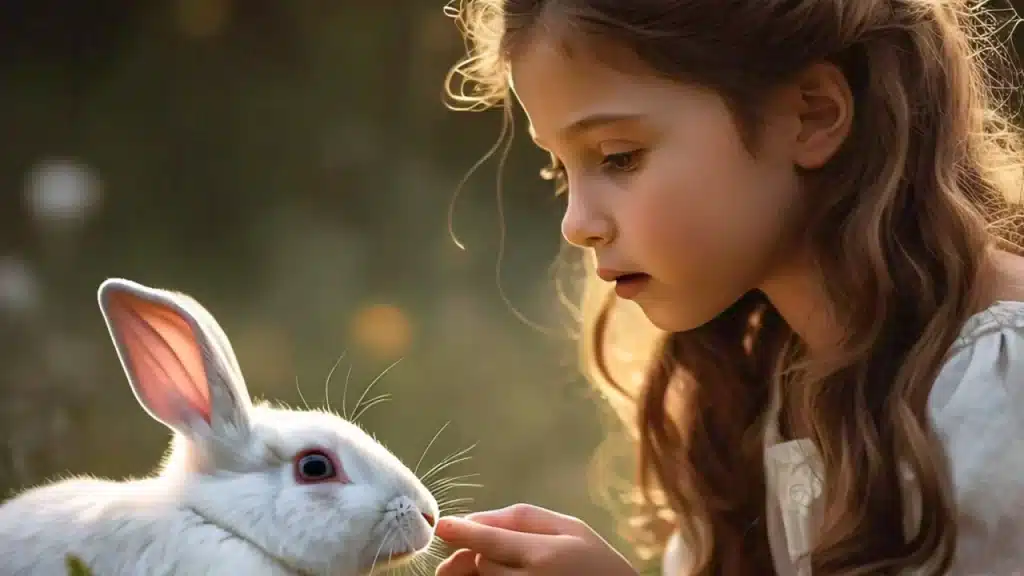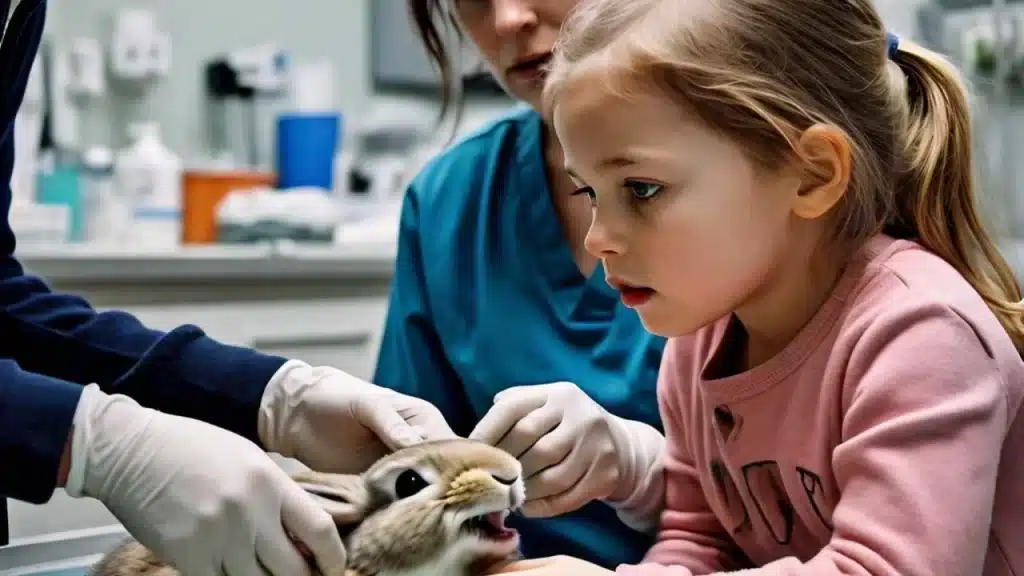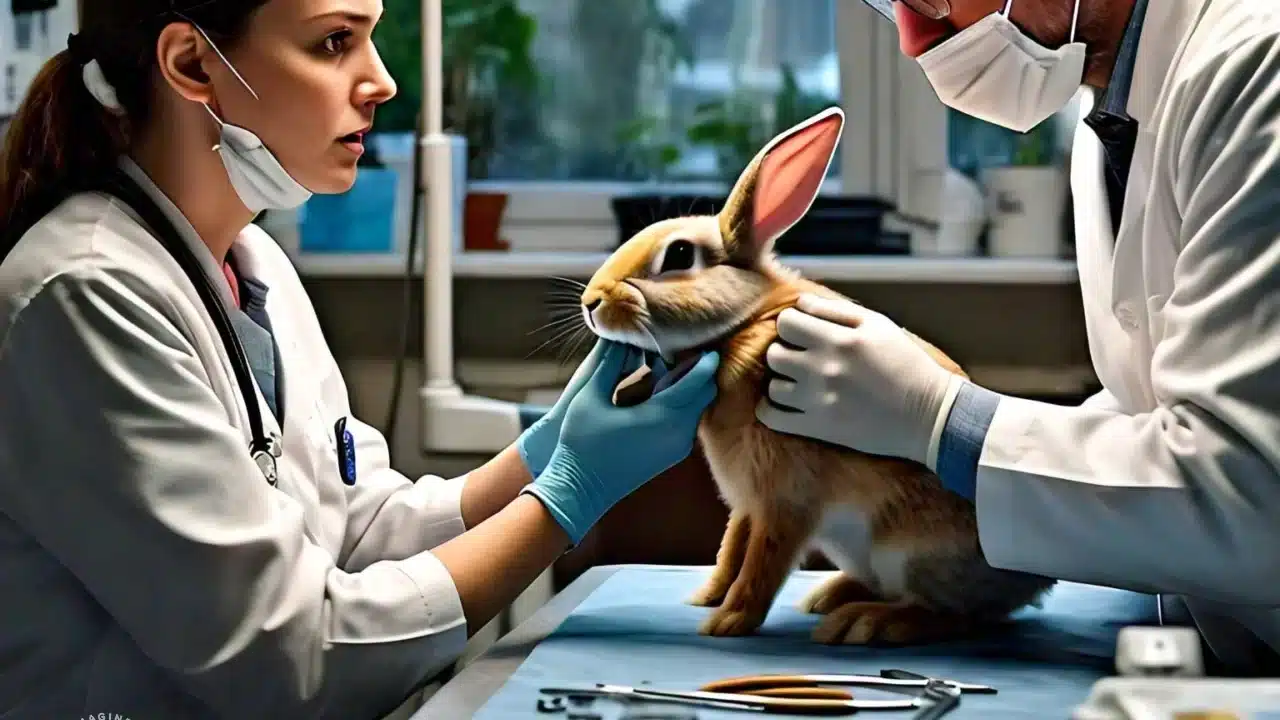– Are you worried about Bunnies Grinding Teeth habit?
– Do you want to know how to prevent and treat this common issue in rabbits?
– This comprehensive guide will provide you with all the information you need to identify, address, and prevent bunnies grinding teeth, ensuring your furry friend lives a happy and healthy life.
PART 1
Understanding Bunnies Grinding Teeth
What is Bunnies Teeth Grinding?
“Bruxism in rabbits refers to the grinding of their teeth, which can be a sign of various underlying issues. Unlike the purring sound that rabbits make when they are content, bruxism is usually louder and more pronounced.” writes Sarah Kolb,
Or it may just be a habitual grinding or clenching of teeth.
However, Teeth grinding in rabbits: –
- Can be a sign of dental problems1, pain, stress, anxiety, or nutritional deficiencies
- Can occur during the day or night
- Often accompanied by other signs such as drooling, foaming at the mouth, or changes in appetite or Body Language
- Can lead to further dental problems if left untreated
- Can cause significant pain and discomfort for your rabbit
Prevalence of Teeth Grinding in Rabbits
Teeth grinding is a common issue in rabbits, affecting up to 80% of the population.
- Can occur in rabbits of all ages
- More common in younger rabbits
- Baby teeth are softer and more prone to wear down, leading to discomfort and teeth grinding
- As rabbits age, their teeth continue to grow2, and if not properly aligned, can cause teeth grinding
- Some breeds are more prone to teeth grinding due to genetic predisposition
Recognizing the prevalence of teeth grinding in rabbits can help you take steps to prevent and address this issue.

Importance of Addressing Teeth Grinding
Addressing teeth grinding is crucial to prevent further dental problems and improve your rabbit’s overall health.
- Can lead to further dental problems such as worn-down teeth3 and abscesses
- Can cause significant pain and discomfort for your rabbit
- Can lead to a decrease in appetite, weight loss, and even life-threatening complications if left untreated
- Can improve your rabbit’s quality of life and overall health
- Can prevent further dental problems4 and reduce the risk of complications
Seeking veterinary care and addressing teeth grinding can help improve your rabbit’s health and well-being.
PART 2
Signs and Symptoms
Signs and Symptoms of Teeth Grinding
PDSA writes, “Depending on how your rabbit is grinding his/her teeth, it could be a sign of pain/illness/distress (loud grinding), or happiness and contentment (quiet, soft grinding)!”
Teeth grinding can manifest in various signs and symptoms, including
- Audible grinding sounds5
- Worn-down teeth
- Changes in appetite or behavior
- Drooling or foaming at the mouth
- Redness or swelling of the gums
- Rabbits Over-grooming themselves

How to Perform a Dental Examination on rabbit to evaluate Bunnies Grinding Teeth ?
Time needed: 5 minutes
Step-by-Step guide to Basic Dental Examination on rabbits
- Prepare Your Rabbit
To prepare your rabbit for a basic dental examination, make sure they are comfortable and relaxed. Gently wrap your rabbit in a towel to help them feel secure and reward them with treats and praise to make the experience positive.
- Open the Mouth
To open your rabbit’s mouth, gently press on the roof of their mouth. Use a small amount of pressure to keep the mouth open, allowing you to visualize the teeth and gums.
- Visual Inspection
Visually inspect your rabbit’s teeth and gums, looking for signs of teeth grinding, worn-down teeth, abscesses, overgrown teeth, redness, swelling, or recession. Check for any visible signs of dental problems, such as chattering or clicking sounds when the teeth come together.
- Check the Incisors
Check the incisors (front teeth) for wear, damage, or overgrowth. Make sure they are properly aligned and not causing any discomfort or pain. Gently press on the incisors to check for any signs of looseness or sensitivity.
- Examine the Cheek and Back Teeth
Examine the cheek teeth and back teeth in the same way, gently pressing on the cheeks and back of the mouth to visualize them. Look for any signs of wear, damage, or overgrowth, and check for proper alignment and any signs of dental problems.
- Palpation
Finally, palpate (feel) your rabbit’s teeth and gums with your fingers to check for any signs of pain or discomfort. Look for any signs of dental problems such as abscesses or overgrown teeth, and consult a veterinarian for a proper diagnosis and treatment plan if you suspect any issues.
When to Seek Veterinary Care
If you notice any abnormal signs of teeth grinding with rabbit breathing heavily or other dental issues6 accompanied with lethargy of rabbits, seek veterinary care immediately.
- Veterinarian can perform a thorough dental examination and provide a proper diagnosis and treatment plan
- Early detection and treatment can prevent further dental problems and improve your rabbit’s overall health
- Don’t hesitate to seek veterinary care if you notice any changes in your rabbit’s behavior or Body Language
PART 3
Causes of Teeth Grinding in Bunnies
In this part, we explore various causes for Teeth Grinding or Bruxism in Bunnies
What causes Teeth Grinding in Bunnies?
- Over Grown Teeth. Overgrown teeth can cause teeth grinding in rabbits due to the discomfort and pain they cause. It can cause the jaw to shift, leading to further discomfort and pain, which can result in teeth grinding.
- Misaligned Teeth. When teeth are misaligned, they can cause the jaw to shift, leading to discomfort and pain, which can result in teeth grinding. It can also cause the rabbit to chew unevenly, leading to further dental problems and teeth grinding.
- Abscesses. Abscesses can lead to swelling and inflammation, which can put pressure on the teeth and lead to grinding. Additionally, abscesses can cause the rabbit to chew unevenly, leading to further dental problems and teeth grinding.
- Dental Problems. Dental problems such as uneven tooth wear, tooth decay, and gum disease can cause teeth grinding in rabbits. These problems can lead to discomfort and pain, causing the rabbit to grind its teeth in an attempt to cope with the pain7.
- Stress and Anxiety. Stress and anxiety in rabbits can be caused by changes in their environment, such as a new pet or person in the home, or changes in their routine, such as litter training a rabbit, a change in feeding times or cage cleaning8. This stress and anxiety can lead to teeth grinding as a coping mechanism.
- Genetic Predisposition. Some rabbit breeds, such as Netherland Dwarfs and Lop-eared rabbits, are more prone to teeth grinding due to their genetic makeup. This is because these breeds have a smaller jaw size and teeth that grow at a faster rate, leading to overcrowding and uneven wear and tear.
- Flea infestation. Flea infection caused by infestation may also cause bunnies to grind their teeth due to stress caused by the fleas.
- Nutritional Deficiencies. Nutritional deficiencies, particularly a lack of calcium and vitamin D, can cause teeth grinding in rabbits. Calcium and vitamin D are essential for strong teeth and bones, and a lack of these nutrients can lead to weak teeth and bones, causing the rabbit to grind its teeth in an attempt to cope with the discomfort. A diet high in sugar and low in fiber can also contribute to nutritional deficiencies and teeth grinding in rabbits.
PART 4
Treatment Options
Treatment options for teeth grinding depend on the severity of the issue.
Tooth Trimming, Extractions, and Restorative Procedures
Explore effective treatments to eradicate bruxism from your bunny and restore their comfort and health.
- Tooth trimming. It can help alleviate discomfort and prevent further wear on the teeth9
- Extractions. It may be necessary if teeth are severely damaged or causing discomfort
- Restorative procedures. Procedures such as fillings or crowns, can help repair damaged teeth

Preventative Care
Preventative care is essential to preventing teeth grinding and other dental issues.
- Regular dental check-ups. can help identify dental issues early on and prevent teeth grinding
- Balanced diet. rich in calcium and vitamin D, can help keep teeth healthy and strong
- Traveling with Rabbits. If you have to travel somewhere with rabbits, do ensure you take all steps for reducing the rabbits stress during traveling.
Pain Management and Supportive Care
Pain management and supportive care are crucial to helping your rabbit recover from dental procedures.
- Pain medication. It can help alleviate discomfort and pain
- Supportive care. Care such as a soft food diet and plenty of water, can help your rabbit recover.
Comfortable and Stress-Free Environment
Creating a comfortable and stress-free environment can help reduce the risk of teeth grinding.
- Provide plenty of hiding places and toys to reduce stress
- Ensure your rabbit has a comfortable place to rest and eat
- Reduce noise and stressors in the environment
- Regularly clean bunny’s cage.
Frequently Asked Question
Here are few of the questions often asked by Bunny Owners about Bunnies Grinding Teeth
Yes, it’s completely normal for rabbits to grind their teeth! If they are are grinding the teeth for Wearing down teeth, Happiness and relaxation, Chewing and eating, Anxiety or stress relief, Boredom or lack of stimulation, Teeth trimming or as Natural behavior. However, if Teeth Grinding is accompanied by Loud grinding, Drooling or foaming, Lack of appetite, Weight loss, Changes in behavior, Visible tooth wear, Gum recession, Tooth fractures, Dental abscesses or Chronic stress then a vet may be consulted.
Your bunny makes a grinding sound due to teeth grinding, also known as bruxism. This can be a sign of contentment and relaxation, often accompanied by soft, gentle grinding noises. However, loud grinding sounds can indicate pain or stress, potentially related to dental problems, anxiety, or other health issues. If you’re concerned about your bunny’s grinding sound, consult a veterinarian to determine the cause and appropriate care.
Teeth clicking in bunnies can be normal, but it can also be a sign of an underlying issue. Soft, smooth teeth clicking can be a sign of contentment and relaxation, like a bunny purr! On the other hand, loud teeth clicking can indicate dental problems like overgrown teeth, misaligned teeth, or tooth decay. Additionally, clicking teeth can be a coping mechanism for stressed or anxious bunnies, or a sign of pain or discomfort, especially if accompanied by other signs like crouched posture, pressed-down ears, reduced appetite, excessive drooling, or low energy. If you’re concerned about your bunny’s teeth clicking, consult a veterinarian to rule out any underlying health issues.
Teeth grinding and purring in rabbits are two distinct behaviors with different meanings. Teeth grinding, or bruxism, is a sign of stress, anxiety, or discomfort, characterized by a loud, intense grinding or clicking sound. In contrast, purring is a sign of contentment, relaxation, and happiness, accompanied by a soft, gentle humming or buzzing sound. While both behaviors involve teeth sounds, the tone, volume, and context help distinguish between them, indicating whether your rabbit is stressed or joyful.
Yes, rabbits do grind their teeth when in pain. Teeth grinding, also known as bruxism, is a common sign of pain or discomfort in rabbits. When rabbits are experiencing pain or distress, they may grind their teeth as a coping mechanism to help manage their discomfort. This can be accompanied by other signs of pain, such as changes in appetite, behavior, or posture, as well as physical signs like redness, swelling, or discharge. Some common causes of pain in rabbits that may lead to teeth grinding include dental problems, gastrointestinal issues, arthritis, or injuries. If you suspect your rabbit is grinding their teeth due to pain, it’s essential to consult a veterinarian to determine the underlying cause and receive appropriate treatment.
References/ Citations
- Sage Publications. (2003). “DOI: 10.1177/154411130301400104” (PDF). Journal of Applied Animal Welfare Science. 6 (2): 147–155. doi:10.1177/154411130301400104. ↩︎
- Taylor & Francis. (1998). “DOI: 10.1080/03014223.1998.9517559” (PDF). Journal of Animal Ecology. 67 (3): 541–551. doi:10.1080/03014223.1998.9517559. ↩︎
- Bird Exotics Veterinary Clinic. (October 20, 2016). “Rabbit Care Guide: Pellets, Teeth, and a Happy Bunny”. Retrieved from https://www.birdexoticsvet.com/post/2016/10/20/rabbit-care-guide-pellets-teeth-happy-bunny ↩︎
- City of Hayward. (n.d.). “Rabbit Health” (PDF). Retrieved from https://www.hayward-ca.gov/sites/default/files/police/Rabbit-Health.pdf ↩︎
- People’s Dispensary for Sick Animals (PDSA). (n.d.). “Why Do Rabbits Grind Their Teeth?”. Retrieved from https://www.pdsa.org.uk/pet-help-and-advice/pet-health-hub/symptoms/why-do-rabbits-grind-their-teeth ↩︎
- Rabbits Online. (n.d.). “How to tell the difference between good/bad teeth grinding”. Retrieved from https://www.rabbitsonline.net/threads/how-to-tell-the-difference-between-good-bad-teeth-grinding.84190/ ↩︎
- Rochford Veterinary Clinic. (n.d.). “Rabbits’ Teeth – Keep Them in Tip-Top Condition!”. Retrieved from https://www.rochfordvets.co.uk/rabbits-teeth-keep-them-in-tip-top-condition/ ↩︎
- PetHelpful. (n.d.). “Sleeping Rabbit”. Retrieved from https://pethelpful.com/rabbits/Sleeping-Rabbit ↩︎
- Wiley Online Library. (2011). “DOI: 10.1111/j.2045-0648.2011.00136.x”. Journal of Small Mammal Practice. 20 (3): 143–148. doi:10.1111/j.2045-0648.2011.00136.x. ↩︎
